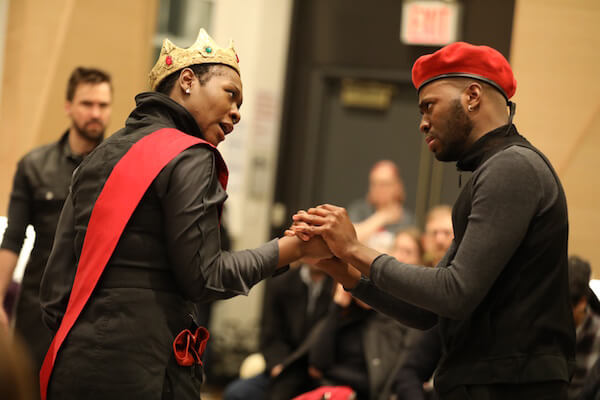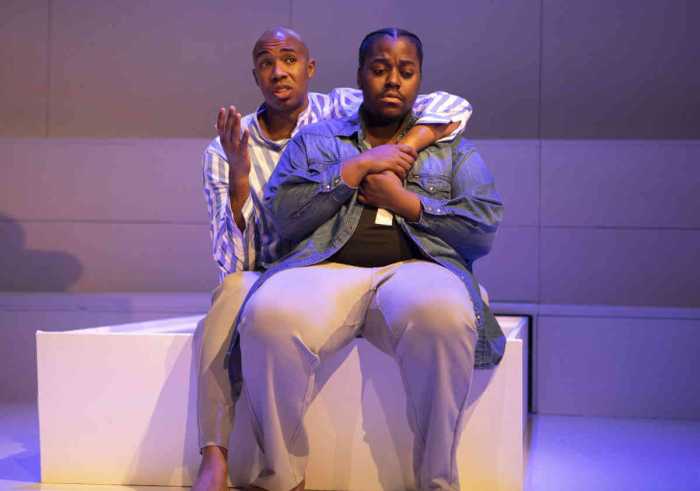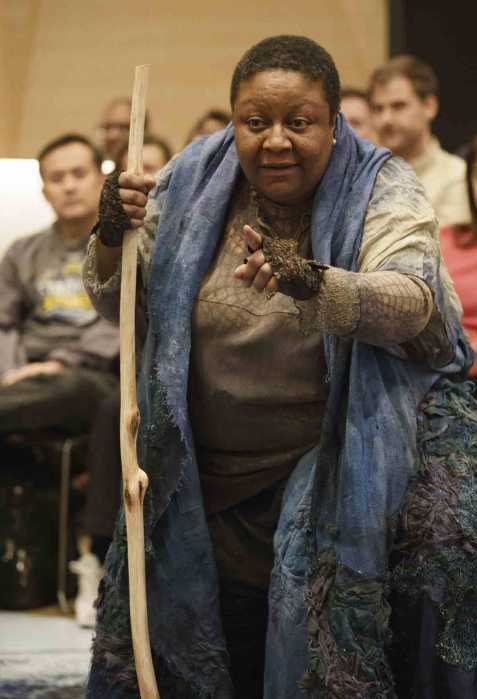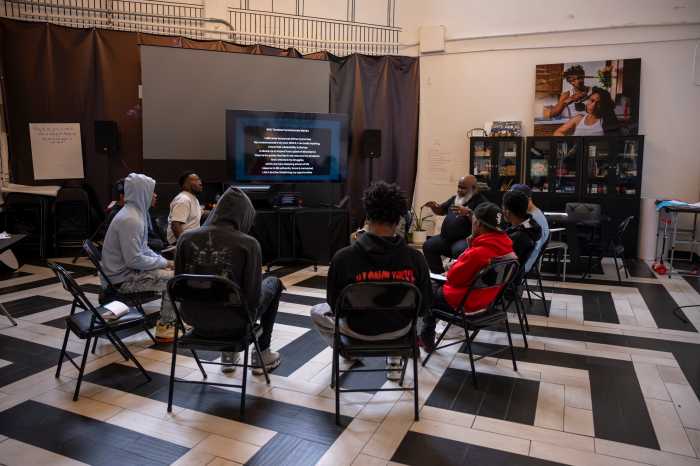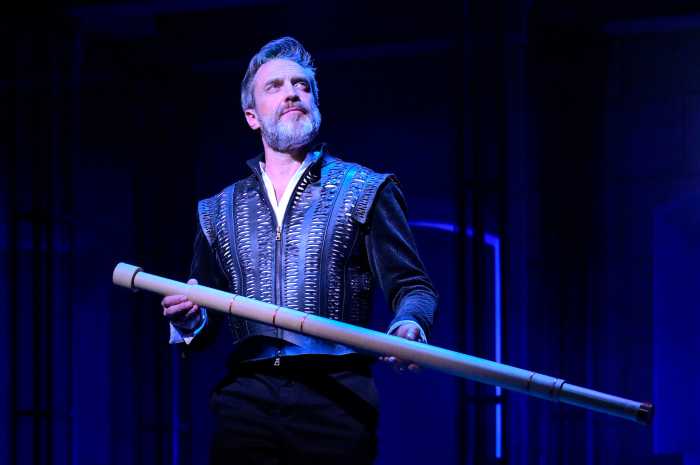Zenzi Williams and Leland Fowler in Robert O’Hara’s Mobile Unit production of “Henry V” at the Public Theater. | JOAN MARCUS
Joseph Papp’s mission in 1957 was to bring Shakespeare to everyone, and 60 years later that spirit lives on in the Public Theater’s Mobile Unit that brings professional productions to locations around the city. Papp believed that culture — and especially theater — belongs to everyone, and the Mobile Unit has toured shelters, prisons, and community centers in the five boroughs.
The bare bones productions are presented much in the same way that Shakespeare’s original audiences would have seen them — on a mostly empty stage with basic lighting; it would have been daylight in Shakespeare’s time — and the actors providing virtually all the effects. The words and the storytelling, then, are what create the experience. And there’s a reason that these plays are still performed four centuries after they were written: they deal in human themes, regardless of whether the characters are kings or clowns.
I’ve long been a fan of the Mobile Unit productions for the visceral, immediate, and passionate way they bring the texts to life. The current production of “Henry V” — which after a five-borough tour is no finishing its run at the Public on May 13 — is no exception. Trimmed to a spare hour and 45 minutes, the cutting emphasizes Henry’s story as king and conquerer. Under the direction of Robert O’Hara, the production is taut, exciting, and highly focused. It features a woman, Zenzi Williams, in the title role, though O’Hara explained he didn’t set out to find a woman to play the role.
Robert O’Hara directs a powerful “Henry V” for the Public Theater’s Mobile Unit
“I said let’s see who comes in for Henry and allowed women to come in,” he told Gay City News. “I wanted to do a Henry who is not a hero. The play investigates his privilege and entitlement.”
He noted that having that exploration in a black female body was just the sort of inquiry he was looking for.
“I felt the vulnerability in her,” he said of Williams.
O’Hara said that he saw a lot of great men for Henry, but there was something about Williams that piqued his interest.
“I like to direct new and interesting things and don’t want to work in predictable ways,” he explained.
He added that since the production was being taken to community centers citywide, a black woman in the role gave many in his audience a chance to see someone who looks like them. The threats of violence, Henry’s invasion of France, and his wrestling with his own limitations resonated with his audiences, O’Hara said.
The demand to work within the limitations of what the Mobile Unit can do in terms of staging was one of the appeals for O’Hara in directing this production.
“You have to engage the audience in a different way,” he said. “You’re out in the open. When a character leaves the stage, everyone can see him or her. The cast has to engage the people in the room and very specifically.”
In this production, that means that the nine-member company turns to the audience and addresses them specifically as soldiers or courtiers or whomever is appropriate.
Combined with a judicious cutting (an entire passage about the legality of royal succession at is trimmed to a few salient lines, for instance), this production is focused on action, and the staging emphasizes movement and the progress of Henry and his army into France with remarkable economy. O’Hara has also cut some of the comic subplots, focusing the comedy on the French specifically.
“The French,” he said, “look like what the English would make fun of. The victor always tells the story.”
O’Hara delves into the darker elements of the politics as well. For example, his take on the final courtship scene between Henry and Princess Catherine of France has a harsh, combative edge. Often this scene is played as a comic romance at the end of the battles, but O’Hara saw it differently, and the effect is startling and powerful.
“This is not a wooing scene,” he said, “it’s a rape scene. Catherine knows that this king has come to France and killed half her people. Taking Catherine is Henry’s last battle, and it is the coerced violation of a woman. She is being bartered, and her body is being taken to another land basically to produce an heir.”
As O’Hara noted, Catherine is still fighting for her own agency and her choices are based in her circumstances.
“Kate is not stupid,” he concluded, “so why should she pretend?”
The result of this perspective is a new and galvanizing take on this scene that is more a dark take on Kate — in “The Taming of the Shrew” — than the naïve romanticism of Juliet.
The cumulative effect of O’Hara’s careful and thoughtful direction is a powerful evening of theater and a gripping tale. Ironically, O’Hara adds, this is only one of Shakespeare’s plays where the author himself says that it can’t be done. There are whole speeches in which the chorus admits the insufficiency of the stage to portray the scope of the scenes, and at several points the chorus returns to tell the audience where they’re going and what’s next. Essentially, Shakespeare says that the audience must provide what stagecraft cannot.
“Piece out our imperfections with your thoughts,” the chorus advises.
Perhaps not surprisingly, it is the audience’s engagement with “imaginary forces” that that propels the players’ power in creating exciting theater.
HENRY V | Public Theater, 425 Lafayette St., btwn. E. Fourth St. & Astor Pl. | Through May 13 only:Tue.-Sun. at 7 p.m.; Sat.-Sun. at 2 p.m. | Free; tickets distributed via publictheater.org/Programs–Events/Mobile-Unit-2018 | One hr., 45 mins., no intermission

